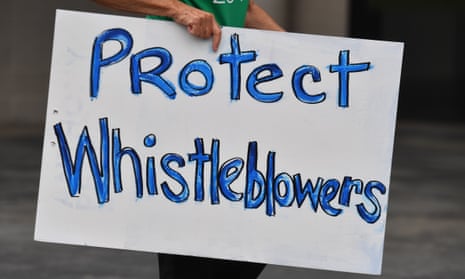Major flaws with Australia’s whistleblowing protections are scaring whistleblowers into silence and hindering journalists’ efforts to expose corruption, according to jailed journalist Peter Greste and constitutional law scholar Rebecca Ananian-Welsh.
A new University of Queensland policy paper, one in a series examining press freedom in Australia, finds “significant gaps and weaknesses” in the Public Interest Disclosure Act, which is designed to protect government whistleblowers from prosecution or civil liability, including on the rare occasions they go to the media.
The paper, authored by Ananian-Welsh, finds the laws create significant barriers for whistleblowers wanting to make their concerns public.
To be shielded by law, whistleblowers must almost always raise the issue internally first, and allow time for it to be investigated.
Only if the internal investigation is inadequate can they go public and, even then, it must be not against the public interest to do so.
The information the whistleblower discloses must be “disclosable conduct” – for example, illegal conduct, corruption, maladministration, or the abuse of public trust – and they must only say the bare minimum when talking publicly. No protection is offered for those blowing the whistle on intelligence matters externally.
In effect, the laws work to keep whistleblower complaints internal and make it hard for whistleblowers to speak publicly about their concerns, including to the media.
That leaves many open to reprisal.
Greste, a journalist who was detained in Egypt for his reporting, said the university’s research showed “indisputably” that the laws were having a chilling effect on public interest journalism and the relationship between journalists and their sources.
“It’s very difficult to quantify a negative, we don’t know just how many stories have gone untold because of the way these laws work,” Greste told the Guardian. “But the consistent evidence across all of the newsrooms, journalists and news organisations that we’ve been speaking to is that the whistleblower legislation and the signal that the AFP raids sent to journalists and their sources means that whistleblowers are increasingly nervous.”
The paper calls for an overhaul of the PID Act, including to recognise professional journalists as legitimate recipients of whistleblower disclosures, and to give weight to public and democratic accountability when determining whether the disclosure is in the public interest.
It also calls for a limited scheme to allow for external disclosures of intelligence information, which would need to adhere to a high public interest threshold and be rigorously regulated. The paper also says that law enforcement information should no longer be treated as intelligence information.
“There has to be accountability,” Ananian-Welsh said. “We can’t have a highly powerful part of our government with invasive powers over metadata access and surveillance and all sorts of things that isn’t held to any level of public accountability or external accountability.
“You need to maintain secrecy when you need to maintain secrecy, but there are ways to maintain accountability as well.”
Ananian-Welsh said there had been a clear shift in recent years that had intimidated and scared whistleblowers. The shift occurred when police started raiding media companies and journalists, and deciding to prosecute whistleblowers, she said.
“Before the raids on the AFP and Annika Smethurst, I’d say the general sense was ‘well there’s uncertainty in the law, but chances are they’re not going to go after whistleblowers who are revealing actual misconduct, they’re not going to go after journalists’.”
“[Now] there’s definitely that shift from ‘no, this is not the kind of prosecution that we pursue’ to ‘yes this is the kind of prosecution we pursue’.”
Such cases include that against Witness K, a former intelligence officer, and Bernard Collaery, his lawyer, who are facing prosecution for their role in exposing the bugging of Timor-Leste during oil and gas negotiations in 2004.
Their cases are still before the court, as is the matter of Richard Boyle, a tax office official who says he acted in line with the nation’s whistleblowing laws to expose his employer’s aggressive pursuit of debts against small businesses.
Both Boyle and Witness K sought to raise their concerns internally first.
In Boyle’s case, it was recently found that the Australian Taxation Office’s response to his complaint was “superficial”. He subsequently went to the ABC and Fairfax with his disclosure. Commonwealth prosecutors considered dropping the case but on Thursday indicated it would proceed to trial.
He now faces a lengthy jail term, if convicted.
Witness K went to the inspector general of intelligence and security and sought approval to speak with Collaery, a lawyer. He was granted this approval.
Witness K is currently preparing to be sentenced in the ACT magistrates court.
